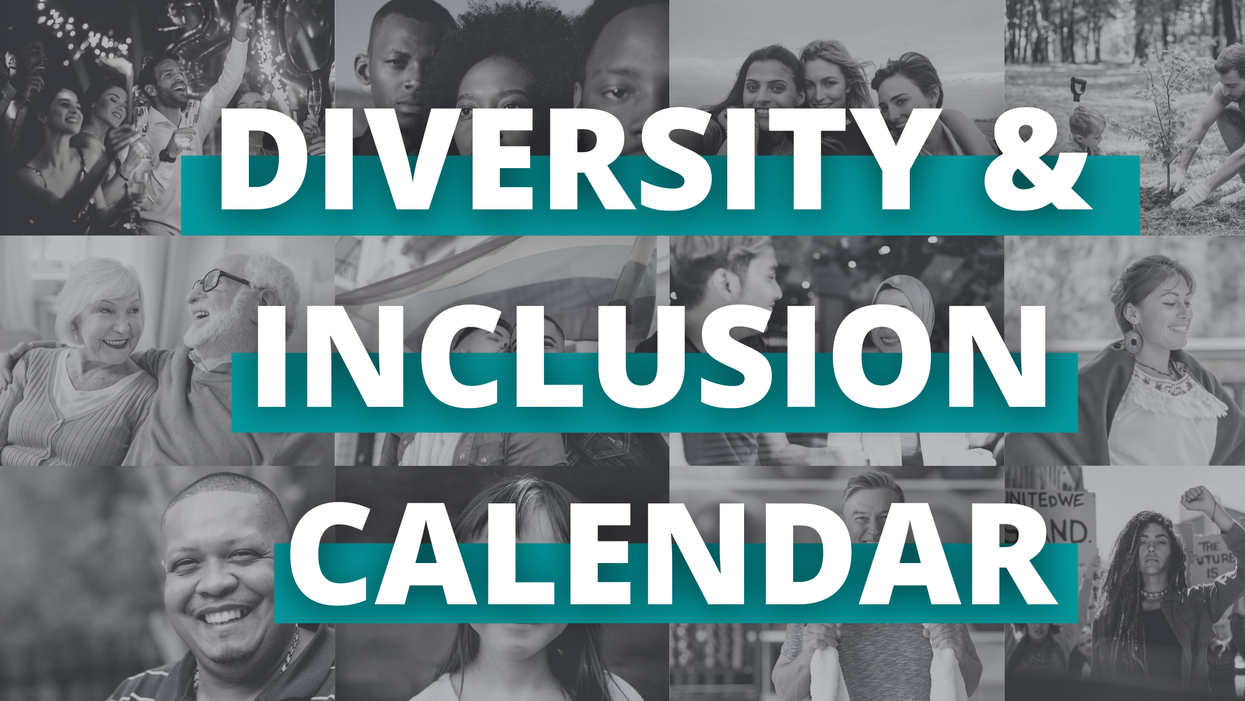Inclusive leaders make their team feel like their whole self is seen and appreciated at work. Being cognizant of different holidays and celebrations can go a long way in doing that.
Perhaps your company chooses to highlight the diversity of your employees by collectively celebrating different festive days. Or maybe you're encouraging employees to use floating paid holidays to mark important days with their families and friends. Either way, a diversity awareness calendar can help you meet your goals. Avoid insensitive missteps by checking against these diversity holidays before scheduling all-hands meetings or company parties.
Start your planning with this diversity and inclusion calendar — and make sure it's truly inclusive by asking your team to add the holidays that are important to them.
*You can sync this calendar with your Google Calendar by clicking the link below!*
*Please note that this calendar does NOT contain all holidays, and is not a replacement for national holiday calendars. It is meant as a supplemental tool to help remind you of diversity celebrations throughout the year, as well as significant dates that may not always be top of mind for you.
If you notice any major holidays that should be added, please reach out to us at hi@powertofly.com and include the subject line Diversity Calendar Feedback.
JANUARY
The 2023 DEIB Calendar begins with month-long observations in January.
- Poverty in America Awareness Month
- Slavery and Human Trafficking Awareness Month
January 1: New Year’s Day, celebrated in most Western countries, is the first day of the year according to the modern Gregorian calendar.
January 3: Feast of the Holy Name of Jesus is celebrated in the Roman Catholic Church and commemorates the naming of the child Jesus.
January 4: World Braille Day is observed to raise awareness around the importance of Braille as a means of communication for blind and partially sighted people. It’s celebrated on the birthday of Louis Braille, the inventor of Braille.
January 5: Twelfth Night is a festival celebrated by some branches of Christianity that marks the coming of the Epiphany.
January 6: Epiphany, or Dia de los Reyes (Three Kings Day), is a holiday observed by Eastern and Western Christians that recognizes the visit of the three wise men to the baby Jesus 12 days after his birth.
January 7: Eastern Orthodox Christians recognize Christmas on this day, 13 days later than other Christian churches, because they follow the Julian calendar rather than the Gregorian version of the Western calendar.
January 7: Mahayana New Year, the day that Mahayana Buddhists celebrate the new year.
January 9: The Birthday of Guru Gobind Singh Ji celebrates the Tenth Guru of the Sikhs who initiated the Sikhs as the Khalsa (the pure ones) and who is known as the Father of the Khalsa.
January 13: Lori-Maghi is an annual festival celebrated by Sikhs commemorating the memory of 40 Sikh martyrs.
January 15: Makar Sankranti is a major harvest festival celebrated in various parts of India.
January 16: Martin Luther King Jr. Day commemorates the birth of Rev. Martin Luther King Jr., the recipient of the 1964 Nobel Peace Prize and an activist for nonviolent social change until his assassination in 1968.
January 18: During the Week of Prayer for Christian Unity, Christians pray for unity between all churches of the Christian faith.
January 16: Timkat is a holiday observed by Ethiopian Orthodox Christians who celebrate the baptism of Jesus in the Jordan River on Epiphany.
January 22: Lunar New Year, a week-long festival that begins with the first new moon of the lunar calendar, celebrated in China as well as in Japan, Vietnam, Korea, and Mongolia.
January 26: Republic Day of India recognizes the date when the Constitution of India came into law in 1950, replacing the Government of India Act of 1935. This day also coincides with India’s 1930 declaration of independence.
January 26: Vasant Panchami, a Hindu festival celebrating spring and Saraswati Devi, the goddess of art and culture.
January 27: The International Day of Commemoration remembers the victims of the Holocaust. It’s the anniversary of the liberation of the Auschwitz death camp in 1945 and UN Holocaust Memorial Day.
FEBRUARY
February is Black History Month in the United States and Canada. Carter G. Woodson started the tradition with the creation of the Association for the Study of Negro Life and History. In 1926, Negro History Week was established. Since 1976, the month has been federally designated to remember the contributions of people of the African diaspora.
Daily Observations:
February 1: National Freedom Day, honoring the signing by Abraham Lincoln of a resolution that later became the 13th Amendment to the U.S. Constitution that abolished slavery.
February 1: St. Brigid of Kildare, celebrated by some Christian denominations, is the feast day for St. Brigid.
February 2: Candlemas is a Christian holiday that celebrates three occasions, including the presentation of the child Jesus, Jesus’ first entry into the temple, and the Virgin Mary’s purification.
February 3: St. Brigid of Kildare is the feast day for St. Brigid celebrated by some Christian denominations.
February 5: Vasant Panchami is the Hindu festival that highlights the coming of spring. On this day, Hindus worship Saraswati Devi, the goddess of wisdom, knowledge, music, art, and culture.
February 5: Maghi-Purnima, a Hindu festival celebrated on the last day of Magha, a month focused on charity work, when devotees often take holy baths and do charity.
February 14: St. Valentine’s Day is a Western Christian feast day honoring one or two early saints named Valentinus. This holiday is typically associated with romantic love and is celebrated by people expressing their love with gifts.
February 15: Parinirvana Day, or Nirvana Day, is the commemoration of Buddha’s death at the age of 80 when he reached the zenith of Nirvana; February 8th is an alternative date of observance.
February 17: Lailat al Miraj , a Muslim holiday commemorating Muhammad's journey from Mecca to the Farthest Mosque in Jerusalem and beginning the night before at sundown.
February 18: Lailat al Miraj is a Muslim holiday that commemorates the prophet Muhammad’s nighttime journey from Mecca to the “Farthest Mosque” in Jerusalem, where he ascended to heaven.
February 18: Maha Shivaratri, a Hindu festival celebrated to honor Lord Shiva and the arrival of spring.
February 20: Presidents Day is a federally recognized celebration in the United States that honors the birthdays of George Washington and Abraham Lincoln, as well as those of every US president.
February 21: Mardi Gras, the last day for Catholics to indulge before Ash Wednesday, starts the sober weeks of fasting that accompany Lent. The term “Mardi Gras” is particularly associated with the carnival celebrations in New Orleans, Louisiana.
February 22: Ash Wednesday is the first day of Lent on the Christian calendar. Its name is derived from the symbolic use of ashes to signify penitence. It happens immediately after the excesses of the two days of Carnival that take place in Northern Europe and parts of Latin America and the Caribbean.
February 25 to March 1: Intercalary Days, or Ayyám-i-Há, is celebrated by people of the Bahá’í faith. During this time, days are added to the Bahá’í calendar to maintain their solar calendar. Intercalary days are observed with gift-giving, special acts of charity, and preparation for the fasting that precedes the New Year.
February 26: Meatfare Sunday, or The Sunday of the Last Judgment, is traditionally the last day of eating meat before Easter for Orthodox Christians.
February 27: Also known as Clean Monday, this is the beginning of Great Lent in the Orthodox Christian faith.
MARCH
March is Women’s History Month. Established in 1987, the month recognizes all women for their valuable contributions to history and society.
More Monthly Observations:
- National Developmental Disabilities Awareness Month was established to increase awareness and understanding of issues affecting people with intellectual and developmental disabilities.
- National Multiple Sclerosis Education and Awareness Month was established to raise public awareness of the autoimmune disease that affects the brain and spinal cord.
Daily Observations:
March 1: St. David’s Day is the feast day of St. David, the patron saint of Wales.
March 2 (sunset) to March 20 (sunset): Nineteen-Day Fast is a time in the Bahá’í faith to reinvigorate the soul and bring one closer to God. This fast takes place immediately before the beginning of the Bahá’í New Year.
March 6: Magha Puja Day, or Maka Bucha, is a Buddhist holiday that marks an event early in the Buddha’s teaching life when a group of 1,250 enlightened saints ordained by the Buddha gathered to pay their respect to him. It is celebrated on various dates in different countries.
March 7 to March 8: Lailat al Bara’a, also known as Lailat Al Baraah, Barat, Shab-e-Bara, or Night of Forgiveness, is an Islamic holiday during which practitioners of the faith seek forgiveness for sins. Muslims spend the night in special prayers. It is regarded as one of the most sacred nights on the Islamic calendar.
March 8: International Women’s Day, first observed in 1911 in Germany, has now become a major global celebration honoring women’s economic, political, and social achievements.
March 13 to April 15: Deaf History Month celebrates key events in deaf history, including the founding of Gallaudet University and the American School for the Deaf.
March 17: St. Patrick’s Day started in Ireland to recognize St. Patrick, the patron saint of Ireland who brought Christianity to the country in the early days of the faith.
March 18: Holi is the annual Hindu and Sikh spring religious festival observed in India, Nepal, and Sri Lanka, along with other countries with large Hindu and Sikh populations. People celebrate Holi by throwing colored powder and water at each other. Bonfires are lit the day before in memory of the miraculous escape that young Prahlada accomplished when demoness Holika carried him into the fire. It is often celebrated on the full moon (the Phalguna Purnima) before the beginning of the vernal equinox as based on the Hindu calendar.
March 19: St. Joseph’s Day in Western Christianity is the principal feast of St. Joseph, the husband of the Blessed Virgin Mary.
March 20: Ostara is a celebration of the spring equinox commemorated by Pagans and Wiccans. It is observed as a time to mark the coming of spring and the fertility of the land.
March 20 to March 21: Nowruz/Norooz, or Persian New Year, is a day of joy, celebration, and renewal. It is held annually on the spring equinox.
March 21: International Day for the Elimination of Racial Discrimination, observed annually in the wake of the 1960 killing of 69 people at a demonstration against apartheid “pass laws” in South Africa. The United Nations proclaimed the day in 1966 and called on the international community to redouble its efforts to eliminate all forms of racial discrimination.
March 22 to March 31: Chaitra Navratri is a nine-day festival that starts on the first day of the Hindu Luni-Solar calendar.
March 25: International Day of Remembrance of the Victims of Slavery and the Transatlantic Slave Trade is a United Nations international observation that offers the opportunity to honor and remember those who suffered and died at the hands of the brutal slavery system. First observed in 2008, the international celebration also aims to raise awareness about the dangers of racism and prejudice.
March 30: Ram Navami is a Hindu day of worship and celebration of the seventh avatar of Vishnu (Lord Rama). Devotees typically wear red and place extravagant flowers on the shrine of the god.
March 31: International Transgender Day of Visibility is celebrated to bring awareness to transgender people and their identities as well as recognize those who helped fight for the rights of transgender people.
APRIL
April is Celebrate Diversity Month, a celebration initiated in 2004 to recognize and honor the diversity surrounding us all. By celebrating differences and similarities during this month, organizers hope that people will gain a deeper understanding of each other.
More Monthly Observances:
- Autism Acceptance Month was established to raise awareness about and acceptance of the developmental disability that impacts an individual’s experience of the world around them.
- National Arab American Heritage Month celebrates the Arab American heritage and culture and pays tribute to the contributions of Arab Americans and Arabic-speaking Americans.
Daily Observations
April 1: Palm Sunday is a Christian holiday commemorating the entry of Jesus into Jerusalem. It takes place on the last Sunday of Lent, at the beginning of the Holy Week.
April 2: World Autism Awareness Day is honored to raise awareness for Autism around the globe.
April 4: Mahavir Jayanti is a holiday celebrated by the Jains commemorating the birth of Lord Mahavira. It is one of the most important religious festivals for Jains.
April 5 to April 13: Passover is an eight-day Jewish holiday in commemoration of the emancipation of the Israelites from slavery in ancient Egypt.
April 6: Holy Thursday, or Maundy Thursday, is the Christian holiday commemorating the Last Supper, at which Jesus and the Apostles were together for the last time before the crucifixion. It is celebrated on the Thursday before Easter.
April 7: Good Friday is a day celebrated by Christians to commemorate the execution of Jesus by crucifixion. It is recognized on the Friday before Easter.
April 8: Lazarus Saturday is a day celebrated by the Eastern Orthodox Church and Oriental Orthodoxy to commemorate the raising from the dead of Lazarus of Bethany.
April 9: Easter is a holiday celebrated by Christians to recognize Jesus’ return from death after the crucifixion.
April 14: Vaisakhi, or Baisakhi, is the celebration of the founding of the Sikh community as the Khalsa (community of the initiated) and the birth of the Khalsa.
April 16: Orthodox Easter, or Pascha, is a later Easter date than what is observed by many Western churches.
April 17 to April 18: Yom HaShoah is Israel’s day of remembrance for the approximately six million Jews who perished in the Holocaust.
April 21 to April 22: Eid al-Fitr is a religious holiday celebrated by Muslims worldwide. Eid al-Fitr marks the end of the month-long dawn-to-sunset fasting of Ramadan
April 21 to May 2: The Festival of Ridvan is a holiday celebrated by those of the Bahá’í faith to commemorate the 12 days when Bahá’u’lláh, the prophet-founder, resided in a garden called Ridvan (paradise) and publicly proclaimed his mission as God’s messenger for this age.
April 22: Earth Day promotes world peace and sustainability of the planet. Events are held globally in support of the environmental protection of the Earth.
April 23: St. George’s Day is the feast day of St. George celebrated by various Christian churches.
April 25 to April 26 (sundown to sundown): Yom Ha’Atzmaut is the national Independence Day in Israel.
April 28: Ninth Day of Ridvan is a festival of joy and unity in the Bahá’í faith to commemorate the reunification of Bahá’u’lláh’s family and by extension the unity of the entire human family the Bahá’í faith calls for. It permeates the symbolic meaning of the Ninth Day of Ridvan.
MAY
May is Mental Health Awareness Month, also known as Mental Health Month. Its aim is to raise awareness and educate the public about mental illnesses and reduce the stigma that surrounds mental illnesses.
Monthly Observations:
- Older Americans Month was established in 1963 to honor the legacies and contributions of older Americans and support them as they enter their next stage of life.
- Jewish American Heritage Month recognizes the diverse contributions of the Jewish people to American culture.
- Asian Pacific American Heritage Month in the United States commemorates the immigration of the first Japanese to the United States on May 7th, 1843 and marks the anniversary of the completion of the transcontinental railroad on May 10th, 1869. The majority of the workers who laid the tracks on the project were Chinese immigrants.
Daily Observations:
May 1: Beltane is an ancient Celtic, Pagan, and Wiccan holiday celebrated about halfway between the spring equinox and summer solstice. The day is often used to celebrate love and romance.
May 3: Feasts of Saints Philip and James is a Roman rite feast day held on the anniversary of the dedication of the Church to Saints Phillip and James in Rome.
May 3: Asian-American Women's Equal Pay Day, marking the fact that Asian-American women earn 90 cents for every dollar earned by white men.
May 4: National Day of Prayer is a day of observance in the United States when people are asked to “turn to God in prayer and meditation”.
May 5: Vesak, or Buddha Jayanti, Buddha Purnima, and Buddha Day is a holiday traditionally observed by Buddhists in South Asia and Southeast Asia as well as Tibet and Mongolia. Commemorating the birth, enlightenment, and death of Gautama Buddha in Theravada, Tibetan Buddhism, and Navayana.
May 5: Cinco de Mayo is a Mexican holiday commemorating the Mexican Army’s 1862 victory over France at the Battle of Puebla during the Franco-Mexican War (1861 - 1867). This day celebrates Mexican culture and heritage with a variety of festivities, including parades and mariachi music performances.
May 8 (sundown) to May 9 (sundown): Lag BaOmer is a Jewish holiday marking the day of hillula of Rabbi Shimon bar Yochai.
May 17: International Day Against Homophobia, Transphobia, and Biphobia is a global celebration of sexual orientation and gender diversities.
May 18: Ascension of Jesus or Ascension Day celebrates the ascension of Christ from Earth in the presence of God within most of the Christian faith.
May 19: Malcolm X Day is a holiday celebrated either on May 19th, Malcolm X’s birthday, or the third Friday in May, to commemorate the Civil Rights leader.
May 21: World Day for Cultural Diversity for Dialogue and Development is a day set aside by the United Nations as an opportunity to deepen our understanding of the values of cultural diversity and to learn to live together in harmony.
May 23 (sundown) to May 24 (sundown): Declaration of the Báb celebrates the day of declaration of the Báb, the forerunner of Bahá’u’lláh and founder of the Bahá’í faith.
May 25 (sundown) to May 27 (sundown): Shavuot is a Jewish holiday with double significance. It marks the wheat harvest in Israel and commemorates the anniversary of the day when the Jews received the Torah at Mount Sinai.
May 28: Ascension of Bahá’u’lláh commemorates the ascension of Bahá’u’lláh, the founder of the Bahá’í faith.
May 29: Memorial Day in the United States is a federal holiday established to honor military veterans who died in wars fought by US forces.
JUNE
Pride Month — Lesbian, Gay, Bisexual, Transgender, and Queer Pride Month was established to recognize the impact that gay, lesbian, bisexual, and transgender individuals have had on the world. LGBTQ+ groups note this time with Pride parades, picnics, parties, memorials for those lost to hate crimes and HIV/AIDS, and other group gatherings. The last Sunday in June is LGBTQ+ Pride Day.
Monthly Observations:
- Immigrant Heritage Month was established in June 2014 and gives people across the United States an opportunity to explore their heritages and celebrate the shared diversity that forms the unique story of the United States. The month celebrates immigrants across the United States and their contributions to their local communities and economy.
Daily Observations:
June 2: Native American Citizenship Day commemorates the day in 1924 when the US Congress passed legislation recognizing the citizenship of Native Americans.
June 4: Trinity Sunday is observed in the Western Christian faith as a feast in honor of the Holy Trinity.
June 14: Flag Day in the United States is observed to celebrate the history and symbolism of the US flag.
June 16: The martyrdom of Guru Arjan Dev is observed by members of the Sikh faith. Guru Arjan Dev was the fifth Sikh guru and the first Sikh martyr.
June 19: Juneteenth, also known as Freedom Day or Emancipation Day, was established as a federal holiday in 2022. This celebration honors the day in 1865 when slaves in Texas and Louisiana finally heard they were free, two months after the end of the Civil War.
June 21: National Indigenous Peoples Day, or First Nations Day, gives recognition to the indigenous populations affected by colonization in Canada.
June 24: Feast of the Most Sacred Heart is a solemnity in the liturgical calendar of the Roman Catholic Church.
June 25: The last Sunday in June is Lesbian, Gay, Bisexual, Transgender, and Queer (LGBTQ+) Pride Day in the United States. It commemorates the Stonewall Riots that occurred on June 28th, 1969.
June 27 (sundown) to June 28 (sundown): Waqf al Arafa is the second day of pilgrimage within the Islamic faith.
June 28 to June 29: Eid al-Adha honors the willingness of Ibrahim to sacrifice his son Ismail as an act of obedience to Allah. As with Eid al-Fitr, it is distinguished by the performance of communal prayer (or ṣalāt) at daybreak on its first day.
JULY
Daily Observations:
July 1: Canada Day, or Fête du Canada, is a Canadian federal holiday that celebrates the 1867 enactment of the Constitution Act, establishing the three former British colonies of Canada, Nova Scotia, and New Brunswick as a united nation called Canada.
July 3: Asalha Puja, or Dharma Day, celebrates Buddha’s first teachings.
July 4: Independence Day, or the Fourth of July, is a US federal holiday that celebrates the adoption of the Declaration of Independence on July 4th, 1776. The original thirteen American colonies declared independence from Britain and established themselves as a new nation known as the United States of America.
July 9: The Martyrdom of the Bab is a day when Bahá’ís observe the anniversary of the Báb’s execution in Tabriz, Iran, in 1850.
July 11: St. Benedict Day is the feast day of St. Benedict celebrated by some Christian denominations.
July 14: International Nonbinary People’s Day is aimed at raising awareness and organizing around the issues faced by nonbinary people around the world while celebrating their contributions.
July 15: St. Vladimir Day is a Roman Catholic feast celebrating St. Vladimir.
July 18: Nelson Mandela International Day was established on July 18th, 2009 in recognition of Nelson Mandela’s birthday via a unanimous decision of the UN General Assembly. It was inspired by a call Mandela made a year earlier for the next generation to take on the burden of leadership in addressing the world’s social injustices. He stated, “It is in your hands now.” It is more than a celebration of Mandela’s life and legacy; it is a global movement to honor his life’s work and to change the world for the better.
July 18 to July 19: Hijri New Year marks the beginning of the new Islamic calendar year.
July 23: The birthday of Haile Selassie I, the former emperor of Ethiopia whom the Rastafarians consider to be their savior, is celebrated on this day.
July 24: Pioneer Day is observed by Mormons to commemorate the arrival of the first Latter-day Saints pioneer in Salt Lake Valley in 1847.
July 25: St. James the Greater Day is a feast day for St. James the Greater celebrated by some Christian denominations.
July 26: Disability Independence Day celebrates the anniversary of the 1990 signing of the Americans with Disabilities Act.
July 27 (sundown) to July 28 (sundown): Ashura is an Islamic holiday marked by Muslims with a voluntary day of fasting. The holiday commemorates the day Noah left the Ark and Moses was saved from the Egyptians by God. For Shia Muslims specifically, this day honors the martyrdom of Husayn ibn Ali, who was the beloved grandson of the Holy Prophet Muhammad (peace be upon him).
July 30: The International Day of Friendship was proclaimed in 2011 by the UN General Assembly with the idea that friendship between peoples, countries, cultures, and individuals can inspire peace efforts and build bridges between communities.AUGUST
AUGUST
Daily Observations:
August 1: Lammas is a festival to mark the annual wheat harvest within some English-speaking countries in the Northern Hemisphere.
August 6: Transfiguration of the Lord, or Feast of the Transfiguration, is celebrated by various Christian denominations. The feast day is dedicated to the transfiguration of Jesus.
August 13 to August 15: Obon, or Ullambana, is a Buddhist festival and Japanese custom that honors the spirits of ancestors.
August 15: Assumption of Blessed Virgin Mary commemorates the bodily taking up of the Virgin Mary into heaven at the end of her earthly life according to the beliefs of the Catholic Church, Eastern, and Oriental Orthodoxy, as well as parts of Anglicanism.
August 17: Marcus Garvey Day celebrates the birthday of the Jamaican politician and activist who is revered by Rastafarians. Garvey is credited with starting the Back to Africa movement, which encouraged those of African descent to return to the land of their ancestors during and after slavery in North America.
August 23: Both International Day for the Remembrance of the Slave Trade and its Abolition and the anniversary of the uprising in Santo Domingo (today Haiti and the Dominican Republic) that initiated the abolition of slavery in the Caribbean are recognized on this day.
August 26: Women’s Equality Day commemorates the August 26th, 1920 certification of the Nineteenth Amendment to the US Constitution that gave women the right to vote. Congresswoman Bella Abzug first introduced a proclamation for Women’s Equality Day in 1971. Since that time, every US president has published a proclamation recognizing the 26th as Women’s Equality Day.
August 30: Raksha Bandhan is a Hindu holiday commemorating the loving kinship between a brother and sister. “Raksha” means “protection” in Hindi and symbolizes the longing a sister has to be protected by her brother. During the celebration, a sister ties a string around her brother’s (or brother-figure’s) wrist and asks him to protect her. The brother usually gives the sister a gift and agrees to protect her for life.
SEPTEMBER
Hispanic Heritage Month is observed from September 15th to October 15th. This month corresponds with Mexican Independence Day, which is celebrated on September 16th and recognizes the revolution in 1810 that ended the Spanish dictatorship.
Daily Observations:
September 4: Labor Day in the United States honors the contribution that workers have made to the country and is observed on the first Monday of September.
September 6 to September 7: Krishna Janmashtami is a Hindu celebration of Lord Vishnu’s most powerful human incarnation, Krishna, the god of love and compassion. Celebrations include praying and fasting.
September 11: The beheading of St. John the Baptist is a holy day observed by various Christian churches that follow liturgical traditions. The day commemorates the martyrdom of St. John the Baptist, who was beheaded on the orders of Herod Antipas through the vengeful request of his stepdaughter, Salome, and her mother. The holiday is celebrated on August 29th for Western Christians and September 11th for Eastern Orthodox Christians.
September 12: Rastafarians celebrate the Ethiopian New Year on this date and believe that Ethiopia is their spiritual home.
September 14: Elevation of the Life Giving Cross (Holy Cross) is a day that commemorates the cross used in the crucifixion of Jesus. It is celebrated by some Christian denominations.
September 15 (sundown) to September 17 (sundown): Rosh Hashanah is the Jewish New Year celebration marking the creation of the world.
September 18: International Equal Pay Day was celebrated for the first time in 2020. It represents the long-standing efforts toward the achievement of equal pay for work of equal value. It further builds on the United Nations’ commitment to human rights and its efforts to eliminate all forms of discrimination, including discrimination against women and girls.
September 19: Ganesh Chaturthi is a Hindu holiday lasting approximately 10 days in which the elephant-headed Hindu god is praised and given offerings.
September 21: Mabon, the second harvest ritual celebrated in Gaelic, Pagan, and Wiccan traditions, is the first day of fall and the celebration of the vernal equinox. The holiday is about gathering wisdom and honoring elders.
September 22: Native American Day is a federal holiday observed annually on the fourth Friday in September in the states of California and Nevada and on the second Monday in October in South Dakota and Oklahoma.
September 27 to 28: Mawlid, Mawlid an-Nabi ash-Sharif, or Eid Milad un Nabi, is the observance of the birthday of the Islamic prophet Muhammad.
September 28: Teacher’s Day in Taiwan is used to honor teachers’ contributions to their students and society in general. People often express their gratitude to their teachers by paying them a visit or sending them a card. The birth of Confucius, the model master educator in ancient China, is also commemorated on this date.
September 29: Michaelmas, or the Feast of Michael and All Angels, is a minor Christian festival dedicated to Archangel Michael that is observed in some Western liturgical calendars.
OCTOBER
October is Global Diversity Awareness Month, a month to celebrate and increase awareness about the diversity of cultures and ethnicities as well as the positive impact diversity can have on society.
More Monthly Observations:
- LGBTQ+ History Month is a US observance that started in 1994 to recognize lesbian, gay, bisexual, transgender, and queer history and the history of the gay rights movement.
- National Disability Employment Awareness Month was launched in 1945 when Congress declared the first week in October as “National Employ the Physically Handicapped Week.” In 1998, the week was extended to a month and renamed. The annual event draws attention to employment barriers that still need to be addressed.
- Black History Month is celebrated in the United Kingdom, Ireland, and The Netherlands.
Daily Observances:
October 4: St. Francis Day is a feast day for St. Francis of Assisi, the patron saint of animals and the environment. It’s celebrated by many Catholic denominations.
October 6 (sundown) to October 8 (sundown): Shemini Atzeret is a Jewish holiday also known as The Eighth (Day) of Assembly. It takes place the day after the Sukkot festival, where gratitude for the fall harvest is deeply internalized.
October 7 (sundown) to October 8 (sundown): Simchat Torah is a Jewish holiday that marks the end of the weekly readings of the Torah. The Torah is read from chapter one of Genesis to Deuteronomy 34 and then back to chapter one again in acknowledgment of the words of the Torah being a never-ending cycle.
October 9: Canadian Thanksgiving is a chance for people to give thanks for a good harvest and other fortunes in the past year.
October 10: World Mental Health Day was first celebrated in 1993 to increase public awareness about the importance of mental health, mental health services, and mental health workers worldwide.
October 11: National Coming Out Day is recognized in the United States to celebrate those who come out as lesbian, gay, bisexual, transgender, or queer as well as the recognition of the 1987 march on Washington for gay and lesbian equality.
October 15 to October 24: Navratri is the nine-day festival celebrating the triumph of good over evil. Festival participants worship God in the form of the universal mother, commonly referred to as Durga, Devi, or Shakti, and the event marks the start of fall.
October 16 (sundown to sundown): Birth of Báb is a Bahá’í holiday celebrating the birth of the prophet Báb.
October 19: International Pronouns Day seeks to make respecting, sharing, and educating about personal pronouns commonplace. Each year it is held on the third Wednesday of October.
October 20: Sikh Holy Day is the day Sikhs celebrate Sri Guru Granth Sahib, their spiritual guide.
October 24 (sundown) to October 25 (sundown): Yom Kippur is the holiest day on the Jewish calendar. This day of atonement is marked by fasting and ceremonial repentance.
October 26 to October 27: Mawlid Al-Nabi is the observance of the birthday of Islam’s founder, the prophet Muhammad. It’s celebrated during the month of Rabiulawal, the third month of the Muslim calendar. Shi’a Muslims celebrate it five days later than Sunni Muslims.
October 31: All Hallows’ Eve, or Halloween, is a celebration observed in a number of countries on the eve of the Western Christian feast of All Hallows’ Day. It begins the three-day observance of Allhallowtide, the time in the liturgical year dedicated to remembering the dead, including saints (hallows), martyrs, and all the faithful departed.
NOVEMBER
November is National Native American Heritage Month, which celebrates the history and contributions of Native Americans.
More Monthly Observations:
- National Family Caregivers Month was proclaimed in 2012 by former President Barack Obama. It honors the more than forty million caregivers across the country who support aging parents, ill spouses, or other loved ones with disabilities who remain at home.
Daily Observances:
November 1: All Saints’ Day is a Christian holiday commemorating all known and unknown Christian saints. In Eastern Orthodox Christianity, the day is observed on the first Sunday after Pentecost.
November 2: All Souls’ Day is a Christian holiday commemorating all faithful Christians who are now dead. In the Mexican tradition, the holiday is celebrated as Dia de los Muertos.
November 11: Veterans Day is a US federal holiday honoring military veterans. The date is also celebrated as Armistice Day or Remembrance Day in other parts of the world and commemorates the ending of World War I in 1918.
November 12: Diwali is the Hindu, Jain, and Sikh five-day festival of lights that celebrates new beginnings and the triumph of good over evil and lightness over darkness.
November 13 to November 19: Transgender Awareness Week is the week before Transgender Day of Remembrance on November 20th. People and organizations participate to help raise the visibility of transgender people and address issues members of the community face.
November 19: International Men’s Day emphasizes the important issues affecting males, including health issues that affect males, improving the relations between genders, highlighting the importance of male role models, and promoting gender equality. This holiday is celebrated in more than 70 countries.
November 20: Transgender Day of Remembrance was established in 1998 to memorialize those who have been killed as a result of transphobia and raise awareness of the continued violence endured by the transgender community.
November 23: Thanksgiving Day in the United States began as a day of giving thanks for the blessing of the harvest and the preceding year.
November 24: Native American Heritage Day is held annually on the Friday after Thanksgiving. The day encourages Americans of all backgrounds to observe and honor Native Americans through appropriate ceremonies and activities. The day was signed into law by President George W. Bush in 2008.
November 26: Feast of Christ the King is a Catholic holiday established to thank God for the gift of time and a rededication to the Christian faith.
November 28 to January 6: Nativity Fast is a period of abstinence and penance practiced by the Eastern Orthodox, Oriental Orthodox, and Eastern Catholic Churches in preparation for the Nativity of Jesus.
DECEMBER
Daily Observations:
December 1: World AIDS Day commemorates those who have died of AIDS and acknowledges the need for continued commitment to all those affected by the HIV/AIDS epidemic.
December 3: International Day of Persons with Disabilities was designed to raise awareness in regard to persons with disabilities in order to improve their lives and provide them with equal opportunity.
December 8: Immaculate Conception of Mary, or the Feast of the Immaculate Conception, celebrates the solemn celebration by various Christian denominations who believe in the Immaculate Conception of the Blessed Virgin Mary.
December 8: Bodhi Day, the Buddhist holiday that commemorates the day that Siddhartha Gautama experienced enlightenment.
December 10: International Human Rights Day was established by the United Nations in 1948 to commemorate the anniversary of the Universal Declaration of Human Rights.
December 12: Feast of Our Lady of Guadalupe is a religious holiday in Mexico commemorating the appearance of the Virgin Mary near Mexico City in 1531.
December 16 to December 24: Las Posadas is a nine-day celebration in Mexico commemorating the trials Mary and Joseph endured during their journey to Bethlehem.
December 18 to December 26: Hanukkah is a Jewish holiday that is celebrated for eight days and nights. Hanukkah celebrates the victory of the Maccabees, or Israelites, over the Greek-Syrian ruler, Antiochus, approximately 2,200 years ago.
December 21: Yule Winter Solstice is celebrated by Pagans and Wiccans. The first day of winter (and the shortest day of the year) represents a celebration focusing on rebirth, renewal, and new beginnings as the sun makes its way back to the Earth. A solstice is an astronomical event that happens twice each year when the sun reaches its highest position in the sky.
December 25: Christmas Day is the day that many Christians associate with Jesus’ birth.
December 26: Boxing Day is a secular holiday celebrated in the United Kingdom, Canada, Ireland, Australia, New Zealand, Hong Kong, and South Africa.
December 26 to January 1: Kwanzaa is a seven-day celebration of African-American culture and life originally founded in 1966.
December 27: St. John’s Apostle and Evangelist Day is the feast day for St. John celebrated by Christian denominations.
December 28: Feast of the Holy Innocents is a Christian feast in remembrance of the massacre of young children in Bethlehem by King Herod the Great in his attempt to kill the infant Jesus.
December 31: Watch Night is a day for Christians to review the year that has passed, make confessions, and then prepare for the year ahead by praying and resolving.
Thanks to the Anti-Defamation League, Diversity Best Practices, and other inclusivity-focused resources for background research!







